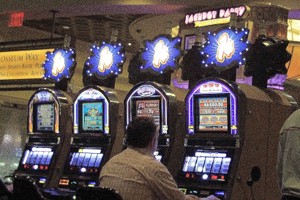One industry that’s always fertile ground — no matter what your business beat — is the casino industry, which seems to be growing more pervasive every year.
Increasingly, communities have come to depend on tax revenue from casinos; in an extreme example, Detroit’s emergency manager was in bankruptcy court recently, testifying that casino revenues were keeping the gasping city from complete financial collapse. Elsewhere, a new casino in Maryland says it’s generating nearly $1 million a day for the state, according to a USA Today report, and interestingly Pennsylvania has supplanted Atlantic City as the No. 2 gaming spot after Las Vegas. But, as Philly.com recently reported, new entries in states like Ohio are starting to siphon patrons from the Keystone State.
And this next one would be an interesting story to localize, depending on the level of detail your state’s gaming board will divulge. The St. Louis Post-Dispatch was able to parse one day’s reported revenue to determine that one of their big casinos had an off session and paid out more than it took in; it’s a fascinating insight into the daily “handle” at a single casino and examining similar records in your area might turn up even better stories. Be sure to ask about unclaimed winnings, too — those bar-coded slips the slot machines emit now instead of coins can be lost or just forgotten, especially if they’re cashed out with balances under $1. But all of those pennies can add up to a big windfall for someone; ask state regulators what states must do about unredeemed vouchers and chips (and ask why the casinos, which can track pretty much everything else about players, can’t just credit cash directly to players’ accounts; they know who cashed out the slips if the players are in a rewards/points program. I bet they could if they wanted to.) Some casinos let bettors drop their unwanted slips into a wishing well, the credits are donated to local charities; there’s another angle as holidays approach.
Clearly, gambling has become mainstream — the American Gaming Association in its May 2013 State of the States report says 34 percent of Americans had visited a casino in the prior year, and that after a recession-induced slump, gambling revenues in commercial casinos were up 4.8 percent in 2012, to more than $37 billion. (And that’s not counting tribal casinos, which don’t have the same reporting or tax-paying duties.) So, if you’re up for a feature on your beat — be it technology, or marketing, or real estate or the economy — you probably can find it at your nearby gambling halls.
If you cover health care, for example, you could check out the latest in treatment for addicted gamblers, or the smoking/alcohol policies at casinos near you, or facilities for disabled gamblers. Or, cover the topic from the workers’ angle — what are casinos doing to prevent on-the-job injuries from occupations like dealing cards and hoisting slot machines? How about assaults? Emotions run high in casinos and workers are vulnerable; last year I saw a frustrated patron screech aloud and violently shove a female players-club manager with both hands. The reason: The player learned she hadn’t qualified for a “free” DVD player the casino was handing out that day to top-tier gamblers. Workers have to deal with that sort of desperation day in and day out, in addition to noise, flashing lights, people impaired by alcohol and often clouds of tobacco smoke. Checking out your state’s OSHA records for casino workers could turn up some interesting trends. And here’s a new one: Now, according to this industry blog, casinos have to worry about repetitive stress injuries among customers who hit the “spin” button hundreds of times per session; you might check with gambling-parlor operators, attorneys and industry associations about whether this is a noticeable trend.
Cover marketing, advertising or personal finance? Why not look into the promotions casinos are offering, from “free” slot play to holiday hams to low-cost or comped hotel rooms; who designs these come-ons and how much do your area’s casinos spend in direct-mail advertising, for example. Here’s a hint: Sign up for the “players club” at each of your area’s casinos; you’ll be astounded at the volume of offers that hit your mailbox, especially if you play a few bucks in the name of research. Let them pile up for a month or so and then get with an industry expert to analyze each casino’s approach and offers. From a personal finance take, you can analyze which casino would, for example, provide the best return on a $100 played into the machines; from whence do the best offers come? What’s the psychology behind those “We’ve missed you; come in for $5 slot play on us” offers? How many people go to retrieve their “free” Thanksgiving turkey, only to put $60 ro $70 into the gambling machines?
And do check out this interesting New York Times piece on indigent people who literally are using casino promotions as a survival tool; it’s quite poignant and worth finding out if your area’s casinos experience a similar phenomenon.
And even if your state is light on gaming venues — or if you just want to locate a non-casino take on the industry — you can find companies that make a buck supplying the needs of gamblers and gambling halls. There’s a good peg coming up: the Global Gaming Expo — aka G2E 2013 — (where else?) Las Vegas, Sept. 23-26.
You can follow the expo via social media and sign up for media alerts that might suggest story ideas; best of all they have a searchable exhibitor list that will help you find companies in your state that are heading to the expo. I did a trial search on North Carolina and found an array of interesting leads, from Hospitality Mints, which makes candy promo items to companies that manufacture money-handling machines and casino furniture. Who knows what interesting small- or medium-sized businesses you could find with ties to the gambling scene.











